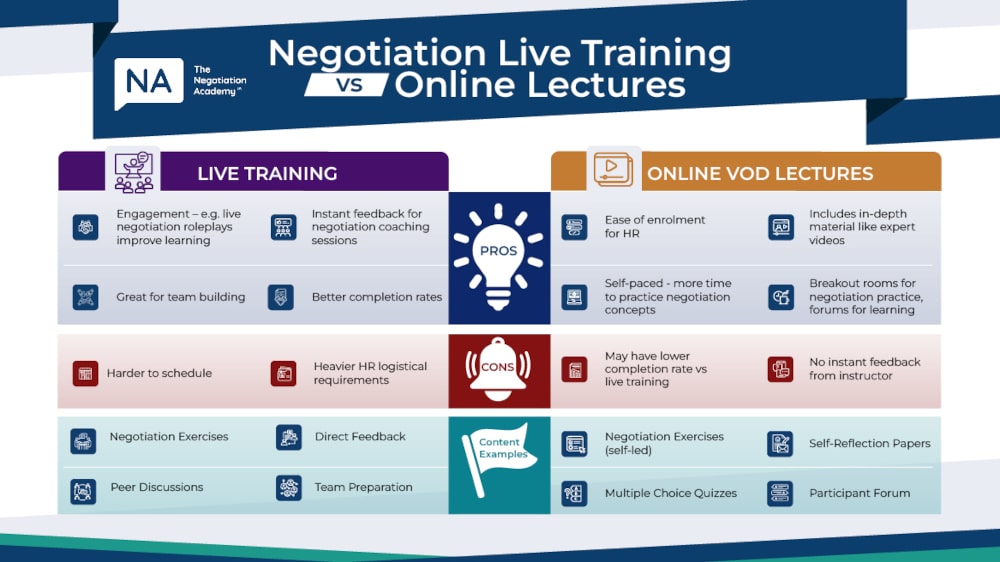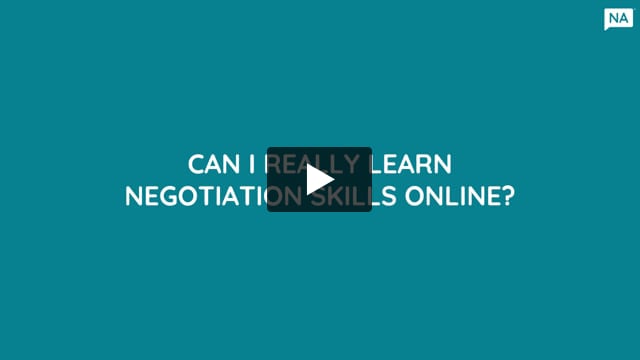“Live training or online course?”
“Large or small scale?”
When it comes to finding the right corporate training courses for your organization, the options and considerations can be overwhelming. This is more so for negotiation skills training – a vital, people-facing skill
To help you out, we’ll show you how to shortlist the right negotiation courses based on your organization’s needs. We’ll also discuss the pros and cons of live training sessions and online courses and what to consider when choosing between them.
Steps to Finding the Right Negotiation Training
There is no “magic bullet” training that hits all the spots for everyone in your company and you’ll need to consider your specific stakeholder’s training needs.
With that said, here are some steps you can take to help narrow down your negotiation course search:
- Define Your Organization’s Objectives and Target Audience: Determine who needs training and their specific negotiation skill requirements.
- Set Criteria for Course Selection:
- Content that you want to cover (i.e. your learning goals)
- Content format (e.g. online of offline)
- Duration and flexibility required
- Accreditation or certification needs
- Research Potential Courses: Use online searches, professional networks, and training providers to shortlist who you might want to work with.
- Evaluate Courses: Look at course reviews, testimonials, instructor credentials, content, and practical applications examples and talk to the person who will be customizing the training for your organization to get a better feel of their approach.
- Cost and ROI Analysis: Consider your budget and the potential return on investment (ROI).
- Shortlist, Comparison and Final Selection: Narrow down your course options based on your priorities. Organize a trial sessions, gather stakeholder feedback, and make a decision.
- Implementation: Enroll participants, monitor progress, and evaluate the impact.
There are major differences between instructor-led live training and online courses with pre-recorded material. Some approaches, like live coaching, can provide customized content, in-depth training, and immediate feedback, while online courses—like the ones found on Udemy—can be freely accessed anytime and are great for busy teams, but they lack customization and immediate feedback.
To determine which of the two methods best suits your organization, we’ll start with steps 1 and 2 of the list above: defining your organization’s needs and setting your course selection criteria.
- Who is the training for, what seniority or specialization among your teams?
- What are their work schedules like? Do they prefer online of in-person training?
- How familiar are they with negotiation and what prior training have they had?
- What level of negotiation skills would we like them to attain? What is the end goal of the training?
If you have a large group requiring a basic understanding of negotiation concepts, pre-recorded online training can work well. Smaller-scale training and coaching sessions could be more suitable for those who are already experienced negotiators and need customized training with personalized feedback.
These constraints will help you narrow down your search to live training or online courses. With that said, here are some pros and cons of both these negotiation course types.

Live Training Vs Pre-recorded Online Lectures
Live Training
Live negotiation skills training has the advantage of letting attendees interact with the speaker and with each other. Interactive demonstrations, such as a show of hands to demonstrate psychological biases in real-time and seeing how people react to competitive and cooperative situations in real-time, can be powerful learning experiences.
As an added bonus, seeing your colleagues’ choices during the interactive parts of the negotiation training and practising with them are great team-building opportunities.
Live Training Formats:
- Instructor-led Workshops: Tailored workshops focusing on negotiation techniques and skills
- Keynotes: Presentations tailored to suit different audiences.
- Events and Off-sites: Interactive sessions ideal for team building.
- Coaching: Small-group coaching sessions for advanced skill development and personalised feedback.
Pros:
- Live Interactions Enhance Learning: Engaging methods such as role-plays and live Q&A sessions make the learning process more effective.
- Roleplays allow people to practice negotiation concepts.
- One great example is seeing the body language of their role-playing partner, which is vital to negotiation. Live polls and interactive demonstrations of psychological concepts within the audience can drive home the point that we all have ways of thinking that impact how we negotiate.
- Better Completion Rates: Live training attendees are more likely to complete the training than online training.
- Instant Feedback: In smaller-scale coaching sessions, participants will receive immediate feedback. They can also ask questions directly to the instructor.
- Team Building: These sessions also serve as excellent team-building exercises.
Cons:
- Scheduling Challenges: Needing to fix a timing can make it difficult to coordinate between attendees and the speaker.
- Logistical Requirements: Requires a venue and additional resources such as audio support.
Pre-recorded or Video-on-Demand Online Courses
With the popularity of sites like Udemy, Coursera, and Khan Academy, online training has come a long way even for teaching people-based skills like negotiation.
Online negotiation skills training courses featuring on-demand lecture videos can be accessed anytime and anywhere. This means that scheduling no longer becomes a problem and that engagement statistics can be tracked by who has completed the courses and earned their certificates.
Online training allows course providers to add videos like case studies, and interviews with experts to show real-world application of negotiation skills. Online forums and debrief videos also allow participants to practice negotiation skills.
You can hear more about how we think about teaching negotiation online here:

Formats:
Online courses vary in terms of which material they provide:
- Video Lectures: Comprehensive and accessible content.
- Interviews with Practitioners: Insights from professionals in relevant fields.
- Case Study Breakout Rooms: An online equivalent of breaking into small groups to negotiate a practice case. Students can then watch debrief videos to see where to improve.
- Online Forums for Students: Online forums for students to discuss concepts and cases.
Pros:
- Flexibility and Ease of Enrollment: Staff can access courses anytime, anywhere, fitting learning into their schedules. Online courses are also less taxing for HR teams to manage.
- More Time to Practice: The on-demand nature of the course gives learners more time to digest new negotiation concepts and practice them in a way that large-scale 1-day workshops don’t allow.
- Depth and Access to Material from More Experts: Online courses can be packed with more information than some one-day workshops. Videos and material from leading negotiators around the world can be included in the online course.
- Online Community Learning: Online breakout rooms can allow learners to practice negotiating with one another in the same way that small-scale negotiation live training provides.
- After practising with others in the breakout rooms, course takers can watch debrief videos extensively covering the case’s strategies, concepts and key numbers.
- Online forums allow students to discuss case studies and learning material, fostering collaborative learning.
- Certification: Online certificates help HR track engagement and completion rates.
Cons:
- Online Learning Attrition: Lacks the immediate feedback and motivation provided by live training. Many students may be too busy to finish the online course.
- No Direct Feedback and Face-to-face Experiences: Participants cannot ask the tutor questions directly nor hear personal feedback on case study or negotiation practice the way that live training in small groups can provide.
There’s no one-size-fits-all solution for choosing between online or live training methods. It’s crucial to consider the needs of your team members who need to improve their negotiation skills.
Having worked with Fortune 500 businesses and leading global law firms for 10+ years, Negotiation Academy brings experience in training over 10k professionals in person and over 15,000 professionals online in 126 countries. This vast experience online and on the ground helps us ensure that we can help you meet your organization’s needs.
Check out our live training and online course catalogue today!



